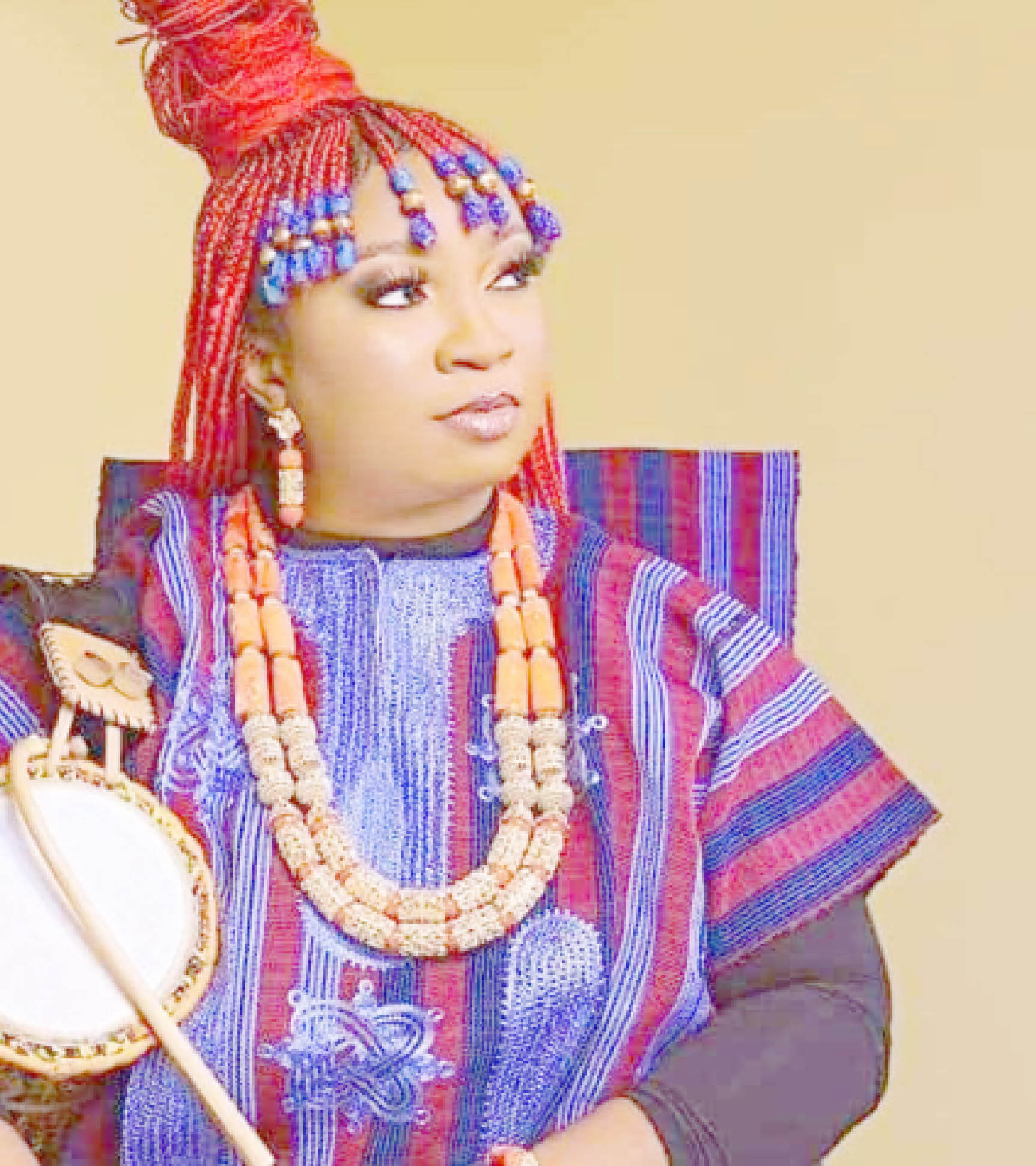Nigeria’s foremost female talking drummer Aralola Olamuyiwa, commonly known by her stage name Ara, shares her journey and experiences playing the talking drum with Weekend Magazine in this interview.
You are known as the first female talking drummer in Nigeria. How has the journey been for the Ara brand?
Well, let me say, thank God for the journey. Of course, every journey has its downside; the good, the bad and the ugly. What is most important is understanding and identifying every season of your journey. We can’t always win; we lose some, we win some. Some of the challenges that you lose would serve as a life lesson to help you get to the next level. So, sometimes, it’s important to actually lose or fail so that you can have a better understanding and in-depth knowledge of your journey and not take things for granted. It’s easy to take things for granted and get carried away by the fame, glamour, money and everything. So, sometimes, God needs to suddenly draw the hand brake of our lives. When that happens, it is calling you to caution; to take cognizance of happenings around you; be it in your spiritual life, marital life or any other area of your life. So, the journey has not been without any of these. But above all, I thank God for the kind of people he brought and keeps bringing my way during these seasons. Yes, it’s not easy, sometimes you just want to give up, but when you remember that it’s not about you — it’s not about me as the first female talking drummer, it’s beyond me. God always finds a way to bring me back.
- Obasanjo, Jega, Okonjo-Iweala deliberate on Nigeria’s challenges today
- Crisis in PDP sending bad signals to Nigerians – Wike
You mentioned stumbling blocks; what are some of the challenges you faced in the male-dominated industry?
At the initial stage of my career, of course, it was the fear of being accepted in a male-dominated field, but we quickly got past that. I was celebrated and still being celebrated. And the number one problem which most talents have is not understanding the business side of being a talent. If you do not understand the business aspect of being a talent, you would get into a lot of trouble like I did. One of which is signing a contract without your lawyer and once you do that, you more or less have gotten into a very deep mess that you must wriggle your way out or wait until the contract expires and dies a natural death, which was the situation in my case. The contract expired in 2007 and I moved on.

Now, moving on, I was a young girl in my early twenties and I was a mummy’s girl and daddy’s girl who had no idea of what was going on out there. I am what Olamide referred to in his song as “Omo get inside”. I had no street sense whatsoever. At the time my contract expired in 2007 and I left the country, I had to face several challenges in my personal life, but on the business aspect, I didn’t have a dime to my name when I left the contract in 2007. A contract that lasted for 6 or 7 years. Even the official car given to me was taken back. Naturally, they would do that. So, I started from zero, with nothing.
And I can tell you, starting from zero, I fell a couple of times because I did not understand the business aspect of showbiz and I had a major trust issue; I couldn’t trust anyone. The few people I came in contact with, they may have been good people, but I had trust issues in terms of management and individuals who wanted to manage me. Also, to me, I realized that they didn’t understand the brand because managing a brand like ‘Ara’ is different from managing a hip hop artiste.
Ara is a world music artiste – an institution first and foremost. So, you just manage Ara at that level, like an institution. I ran into a couple of problems. I made money, I lost money because I wasn’t doing the right thing by investing. My marriage ran into a ditch and I had to move on. That was another emotional setback that took me time to overcome. I got back on my feet and tried my hands on a few other businesses. I ran a boutique while still doing my music, ran a unisex hair salon and everything went down the drain because I didn’t have the experience and I didn’t get good business advise.
Would you say the issues you had in your career and marriage affected your creativity in any way?
I wouldn’t say that my relationship affected my creativity or talent or ability to perform. As a matter of fact, ‘Ara’ the brand is the extrovert, but Aralola Olamuyiwa is more of an introvert. So, I am able to separate both. When I was going through that emotional turmoil in my marriage, I wrote a couple of songs. I had my son, and then diverted my entire attention to him. One of the songs I wrote then, which was produced by Wole Oni, is titled ‘Otito’. That song talks about the truth. At that point in time, I was lost and I just wanted the truth. I kept asking him “where are you? In my mind and subconscious, I kept asking “where is the truth?” “Where are you?” I referred to the truth as someone that we all need, whether as adults, kids, the whole world. We all need to seek the truth and how we can find it. So, that was when I wrote those songs. Then I did a couple of gospel and motivational songs. I made a full gospel album from my experience.
How would you advise up coming artistes from the “trenches” signing contracts that look attractive to them at the moment?
My advice to them is: if you have the talent, look for someone that genuinely believes in your talent. Look for someone that is not in competition with you and make sure that you’re visible. In my own case, my father was a senior manager at UBA. So, starting out, I had the opportunity to perform at end-of-year party for children at UBA. I was getting visibility, even from primary school as a drummer, singer and dancer.
In 1987, I got my first break on television; my father put me out there. My father was my first manager and that was the promise he kept because I had a near death experience and the doctors said they didn’t know what to do as they didn’t know what was wrong with me. In Yoruba terms, seek traditional cure. But, my dad got all hands on deck.
I was considered an “emere” because they felt I wanted to go back to where I came from. Then, one day, my dad reminded me that “you know you want to be a star like Michael Jackson. If you die, then you can’t be a star. Promise me you won’t die and I promise I would make you a star.” This is someone that they have tried to do everything for – bought me bicycle, clothes, and so on. But the moment my dad said that to me, the following day I was on my feet.
In 1987, he took me out there. I did my first audio recording which was freedom for Mandela. So, it’s important you put yourself out there – be visible and look for someone who believes in you; someone who genuinely roots for you because you can’t do it alone. You may get noticed, or together, you may know some people who would say we believe in what you’re doing, let us support you. It starts from people who believe in what you’re doing and can give freely to support the development of your brand and talent. And then, one day, somebody may recommend you and say “I know somebody who knows somebody. Would you like to come for audition?” It depends, just make sure you’re out there. Thank God for social media; put yourself on social media. During my own time, there was not social media.
As a talented artiste, why the talking drum? Why did you pick that instrument out of the wide range of musical instruments? At what point in your life did you start learning it, and how long did it take to learn it?
This is the same question Prof Wole Soyinka asked me when he invited me for lunch at his house and it was one of the most memorable times of my life and career. That was in 2006 or 2007.
For me, it is spiritual because the taking drum chose me. It is beyond music for me. During the last Ayan Agalu festival in Ile-Ife, the Ooni of Ife made me understand that the first Ayan Agalu was a female in Ile-Ife and was a favourite of Adimula and that “Ayan” was called “Ayo” meaning favourite. Now, I am still begging for time to sit before the Ooni to tap into this history. I made a few calls to Professors that I know in Yoruba and we had a deep conversation but I wouldn’t want to put it out there until I have concluded my research on that. But in conclusion for the sake of this interview, she (Ayan) came and it is believed that she re-incarnated in me.
When I picked up the talking drum for the first time (I was in primary school then), in the 80s, and I started playing in 1999/2000, I used to have a visitation by an old woman and I told my mum. I am a descendant of Alake of Oyo, Oba Abiodun Deromu, Atiba; and this is deep but I would share it someday.
I told my mum a woman visits me and explains things to me, but I don’t know her. And my mum said “maybe that’s your great great great great grandmother who is the daughter of Alaafin of Oyo who is happy that you’re playing the drum”. But recently, I realized that’s Agalu herself that was coming to me. Of course, I had other various visitations before I went public with the talking drum. That is how I know I was chosen for that instrument. Ayan Agalu and the talking drum chose me. I didn’t have this history then when I met with Prof Soyinka but I just told him my little understanding then of how I started playing the drum and the visitations. I explained to him; perhaps I was looking for answers because a lot of things happened that I didn’t even understand. Things I couldn’t tell people because it seemed unreal. So, the talking drum chose me for a reason beyond music.
Your craft has to do with life band and stage play, do you nurse the fear that the talking drum may become obsolete in the Nigerian music industry?
Not at all. I would tell you why. Can the people do without our culture? Our culture is our DNA. Can you do without your DNA? It is who we are; there are different aspects of our culture and music is one of them. The taking drum is a prominent traditional musical instrument of the Yoruba people and culture. There is no way that it would go into extinction. And then, about life music and DJ performances, I believe there is room for growth. With the few we have noticed, some of my colleagues who used to do ‘track 1, track 2’ now perform with live bands because people want authentic and organic music; life music. People want to feel you, hear your voice and feel your natural self on stage. So, it would never go extinct.
You haven’t been linked with anyone romantically since your last relationship. Are you in a relationship?
I am not seeing anyone. I am a very single woman but very open to love. I still look forward to being loved and loving, and I look forward to getting married again when the time is right and to the right person. It didn’t work out the first time, I don’t want that to happen again.
What is Ara up to at the moment? What are some of the things you are working on for your fans?
I released ‘Omo Yoruba’ music video about two months ago. Then, we just concluded ‘Otito’ video. Before the end of the year, Eko Inspire me Academy is going to hit your screens. It going to run for 10 years. It’s a project borne out of the experience I had at Oshodi about 10 years ago. So, finally, we got the endorsement letter from the Lagos State government. It is a project that involves a lot of ministries as it concerns changing our lives. It is a reality TV show strictly for the street. So, you can imagine the drama and entertainment; so, get ready.

 Join Daily Trust WhatsApp Community For Quick Access To News and Happenings Around You.
Join Daily Trust WhatsApp Community For Quick Access To News and Happenings Around You.


